In business, terms like CRM and Email Marketing are often mentioned. But what do these terms actually mean? And what is the difference between CRM and Email Marketing?
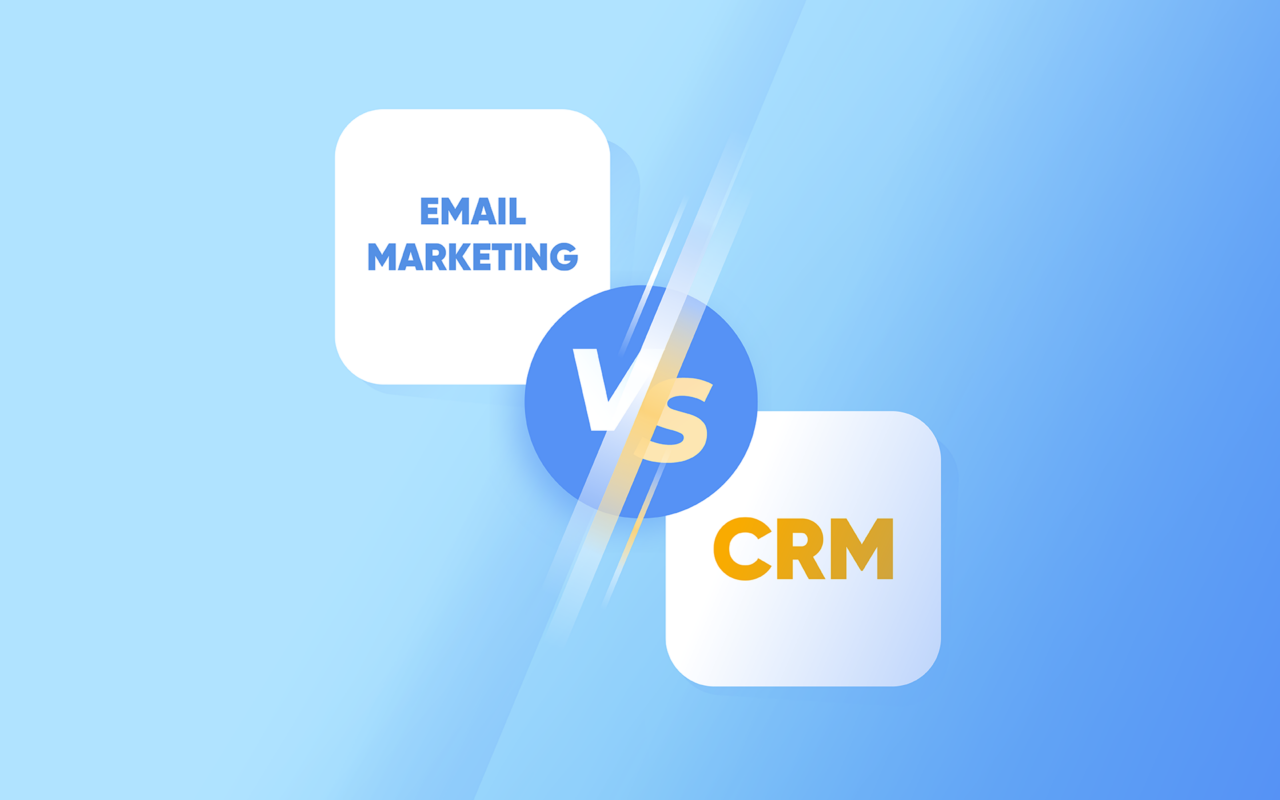
A CRM system, where CRM stands for Customer Relationship Management, is essentially a tool a company uses to manage its interactions with customers. You can think of it as a business's helper, aiding the business in keeping its contacts and correspondence organized. The better-organized customer communication is, the higher the level of customer service.
On the other hand, we have Email Marketing. It's about using email to promote the product or service that a business provides. One can think of it as sending out letters about a business, but in this case, sending them online. It's an effective, low-cost way to connect with customers.
In this article, our focus will be on CRM systems and Email Marketing. We'll delve into what they are, what they do, and how they're not the same. We will also take a look at how a CRM system that integrates with Outlook can also offer email marketing and discuss CRM mass email value.
Table of Contents:
A Detailed Explanation of CRM
Features of a CRM
Benefits of CRM
So What is Email Marketing?
Benefits of Email Marketing
CRM vs Email Marketing
Overlapping Areas Between CRM and Email Marketing
Differences in CRM and Email Marketing Applications
How CRM and Email Marketing Can Complement Each Other
The Power of Integrated CRM and Email Marketing
Mastering Customer Connections
A Detailed Explanation of CRM
When we talk about CRM, we're not merely discussing a piece of software or an application. As the acronym states, is about Customer Relationship Management. Businesses use it to manage and improve their interactions with customers and prospects
The core principle of CRM revolves around understanding your customers in a profound way. But what does this understanding entail? It’s about digging deeper into the identity of your customers, getting to know their preferences, their needs and their purchasing habits. It’s also about gathering their feedback about your products or services.
Moreover, CRM focuses on determining what your customers want. By tracking interactions and studying patterns, CRM helps to unearth the needs and wants of customers, often even before they realize it themselves. This could range from identifying the kind of products a customer might be interested in, to understanding the best way to communicate with them.
Another critical aspect of CRM is figuring out how you can meet these identified needs. This might mean making product recommendations based on a customer's previous purchases. Or it could mean tailoring communication strategies according to customer preferences.
“By automating mundane tasks, CRM frees up more of your team's time to focus on what matters most – building and nurturing customer relationships.”
Above all, CRM is a potent tool that can greatly boost a business’s efficiency. It streamlines processes, promotes teamwork, and optimizes customer interactions. By automating mundane tasks, CRM frees up more of your team's time to focus on what matters most – building and nurturing customer relationships.
Importantly, CRM plays a significant role in customer satisfaction. By ensuring customers feel heard, understood, and valued, CRM helps in building long-term relationships. This is achieved through the prompt and personalized communication that the system enables.
Features of a CRM
While there are many CRMs on the market (some coming with elaborate features that never get used) a good CRM will incorporate the following features:
- Contact Management: This is where it all begins. Keeping track of customer information is crucial. A CRM records names, contact details, and interaction history. And when integrated with Outlook, every email that comes into the inbox is saved and can be followed up on as a lead.
- Sales Management: This is all about tracking sales activities. With all deals and potential leads in one place, the whole team has a bird's eye view of sales action. Automated reminders also ensure the continuation of communication. This safeguards against leads going stale.
- Workflow Processes: A CRM system helps streamline everyday tasks. It's much like a personal assistant, helping to automate and simplify routine tasks. One of the most significant advantages here is its ability to set reminders for follow-ups and tasks, ensuring that customers are never overlooked or forgotten. The system automatically schedules these reminders, acting as an efficient and reliable personal assistant that helps your team keep track of all necessary communications.
- Project Management: The project management feature means that you can organize emails, tasks, and meetings by project. This helps all correspondence relating to a particular project to be better trackable.
- Customer Service: CRM helps prevent customer issues from falling through the cracks. With the whole team having access to communications, and CRM for mobile making it available on the go, troubleshooting is far simpler.
In addition, the CRM's ability to communicate with customers via bulk email is advantageous on multiple levels. Not only is it a tool with which to offer incentives to potential customers, but also to send special offers to existing customers.
 Did you know that according to Finances Online, 65% of professionals rate ease of use as a top CRM feature.
Did you know that according to Finances Online, 65% of professionals rate ease of use as a top CRM feature.
Benefits of CRM
Now that we’ve established the features a good CRM should offer, let's talk about the benefits.
- Improved Customer Service: A good CRM means happier customers. It ensures they receive prompt attention. It also ensures their issues and questions are resolved quickly and effectively.
- Enhanced Communication: With CRM, your team has access to the same information. This means better communication and a more coordinated approach to serving customers.
- Automation of Everyday Tasks: Let's face it, nobody likes paperwork. CRM takes care of the routine stuff, so your team can focus on the bigger picture.
- Increased Productivity and Collaboration for Teams: Whether it's sales, marketing, or customer service, a CRM helps the whole team work better together. This is thanks to all information being readily accessible by anyone on the team.
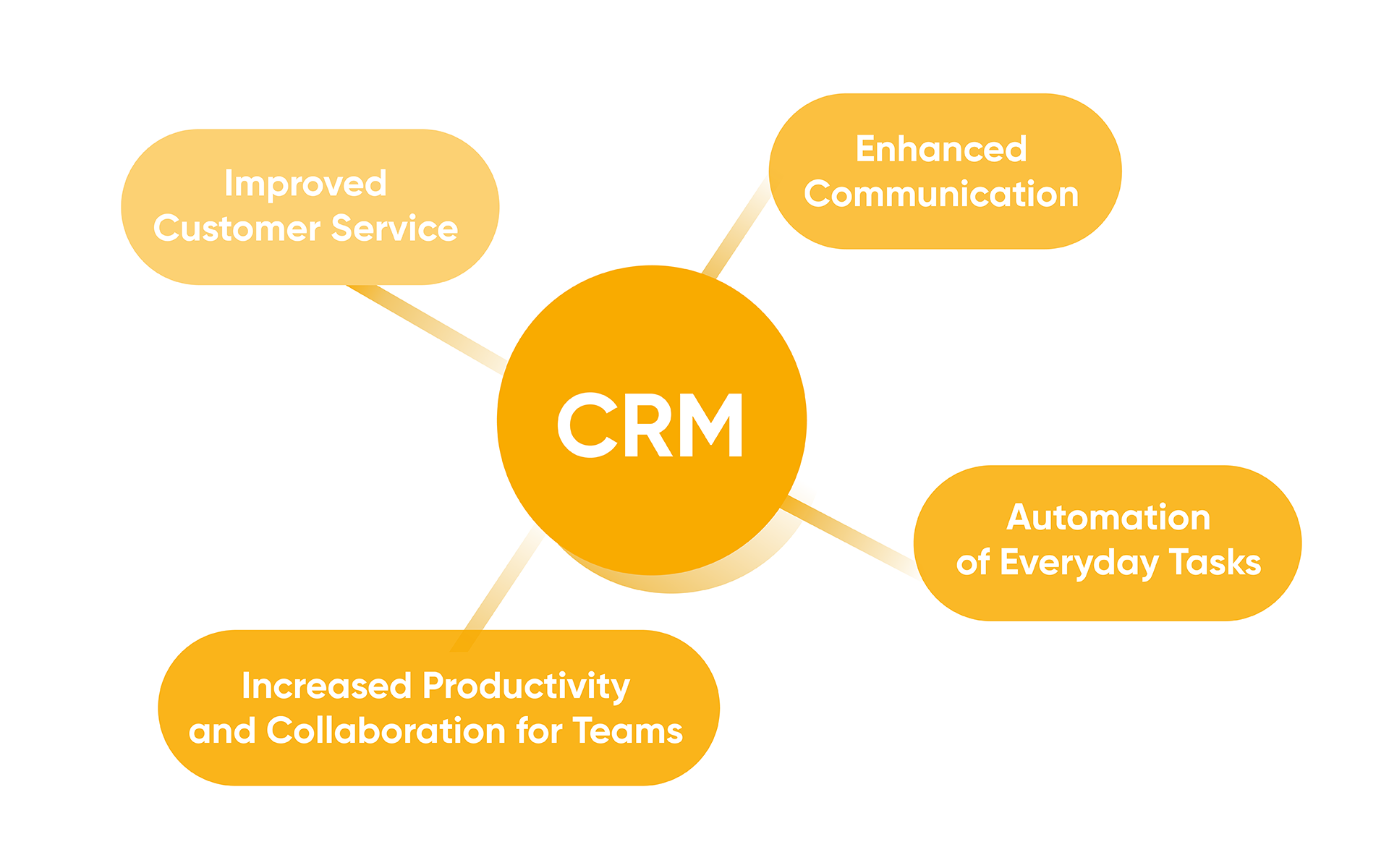
So, that's CRM in a nutshell. When used correctly, it can transform the way you do business.
So What is Email Marketing?
Email marketing is a great way to stay in touch with your customers and promote your products or services. It's also a relatively inexpensive way to reach a large audience. Let’s take a more detailed look.
Explanation of Email Marketing
Email Marketing, at its heart, is about communication. And it's not just about selling products. It's also about building relationships, sharing news, and creating a community around a brand.
So, what makes up Email Marketing?
- Email List Building: Usually the starting point of any email marketing campaign. It's about gathering emails ethically and responsibly, always respecting privacy. The people who are added to the list are those who have shown interest in a business and are most likely to engage with the content.
Email addresses are collected through various means such as offering valuable content, discounts, or exclusive offers in exchange for an email address. From time to time, email addresses can be checked to see if they are still valid by using an email list cleaner, which can lead to reduced bounce rates and improved deliverability for your campaigns.
- Email Campaign Creation: Next comes crafting the emails. Here care will be taken to create emails that are engaging, relevant, and valuable. You can run your campaigns through a DKIM checker first to ensure smooth delivery as well.
- Personalization and Segmentation: Recognizing that each customer is unique, with different needs and preferences, is useful for email marketing. Instead of a one-size-fits-all approach, emails can be customized and sent to specific segments of your audience. This could be based on factors like their buying behavior, interests, location, or past interactions with the business.
By doing so, the content becomes more relevant and engaging for each reader. It's essentially about delivering the right message, which resonates with the individual customer's needs, at the most opportune time.
- Analytics and Reporting: Just like CRM, Email Marketing also provides insights. It lets a business see how their emails are performing. It shows which ones are opened and which are ignored. It will show how many opens per particular email address. It will also show the action the customer took when reading the email, such as link clicks. All of these insights help businesses learn and improve.
Based on this knowledge, sales teams can build follow-up campaigns that are tailored to those customers who didn’t open the email or take the desired action within the email.
Sales reps are also equipped with the insights needed to to make strategic sales calls to those who showed an interest in the product.
Benefits of Email Marketing
So why do businesses adopt Email Marketing?
- Cost-effectiveness: Compared to traditional marketing, Email Marketing is affordable. It allows businesses to reach a large number of people without spending a fortune.
- Increased Brand Awareness: Every email sent exposes recipients to your brand. Consistent, quality emails build familiarity and trust over time.
- Targeted and Personalized Content: With Email Marketing, you can segment your audience. This means delivering personalized content that resonates with different groups of customers.
- Analytics and Conversion Tracking: Email Marketing provides measurable results. It allows you to track who opened your emails, which links were clicked, and how many people made a purchase.
- Improved Sales: When done well, Email Marketing can directly contribute to sales. It can turn potential customers into loyal ones.
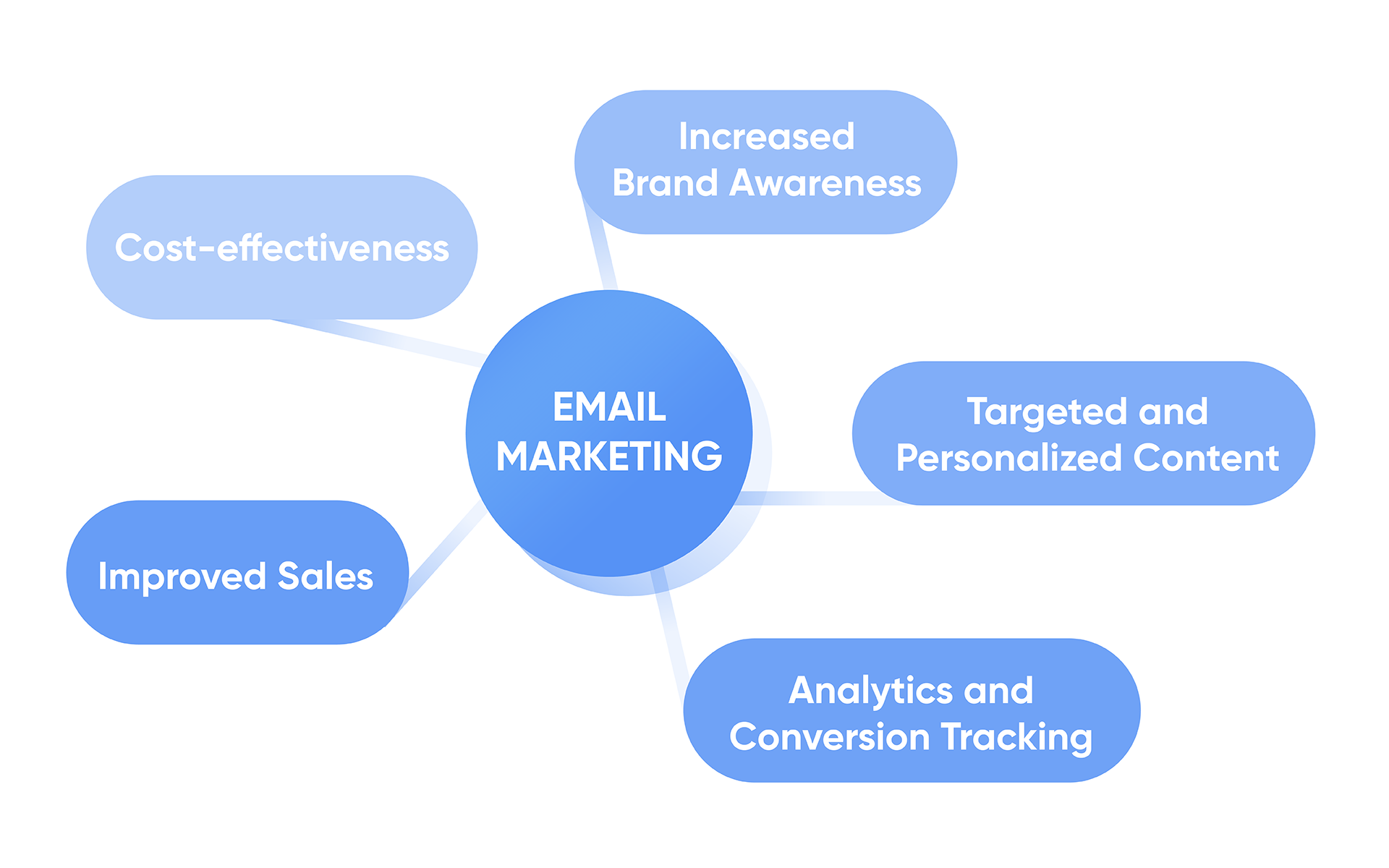
CRM vs Email Marketing
So we've looked at CRM and Email Marketing individually. To put them side by side, we can now discuss the similarities and differences. We will also discuss how CRM and email marketing can work effectively together.
Overlapping Areas Between CRM and Email Marketing
- Customer Segmentation: Both CRM and Email Marketing care about who the customer is. They both allow for segmentation, breaking down customers into specific groups. Both have a keen focus on understanding who they are communicating with.
- Customer Engagement: Both tools are designed to connect with customers. Whether it's through personalized emails or improved customer service, it's all about creating positive customer experiences.
- Analytics and Reporting: Both CRM and Email Marketing offer valuable insights. They track data and provide reports. Therefore both methods have the ability to show a business what is working and what is not.
Differences in CRM and Email Marketing Applications
- Scope: CRM is a broader strategy, dealing with all customer interactions. Email Marketing, on the other hand, focuses on communication through emails.
- Purpose and Goals: CRM aims at building and maintaining relationships with customers, leading to long-term business growth. CRM is also focused on organizing data. Email Marketing, though also about building relationships, is more geared towards promoting products and services and driving immediate sales.
- User Engagement Strategies: CRM engages customers through multiple channels, including phone calls, meetings, social media, etc. Email Marketing, as the name suggests, engages customers primarily through emails.
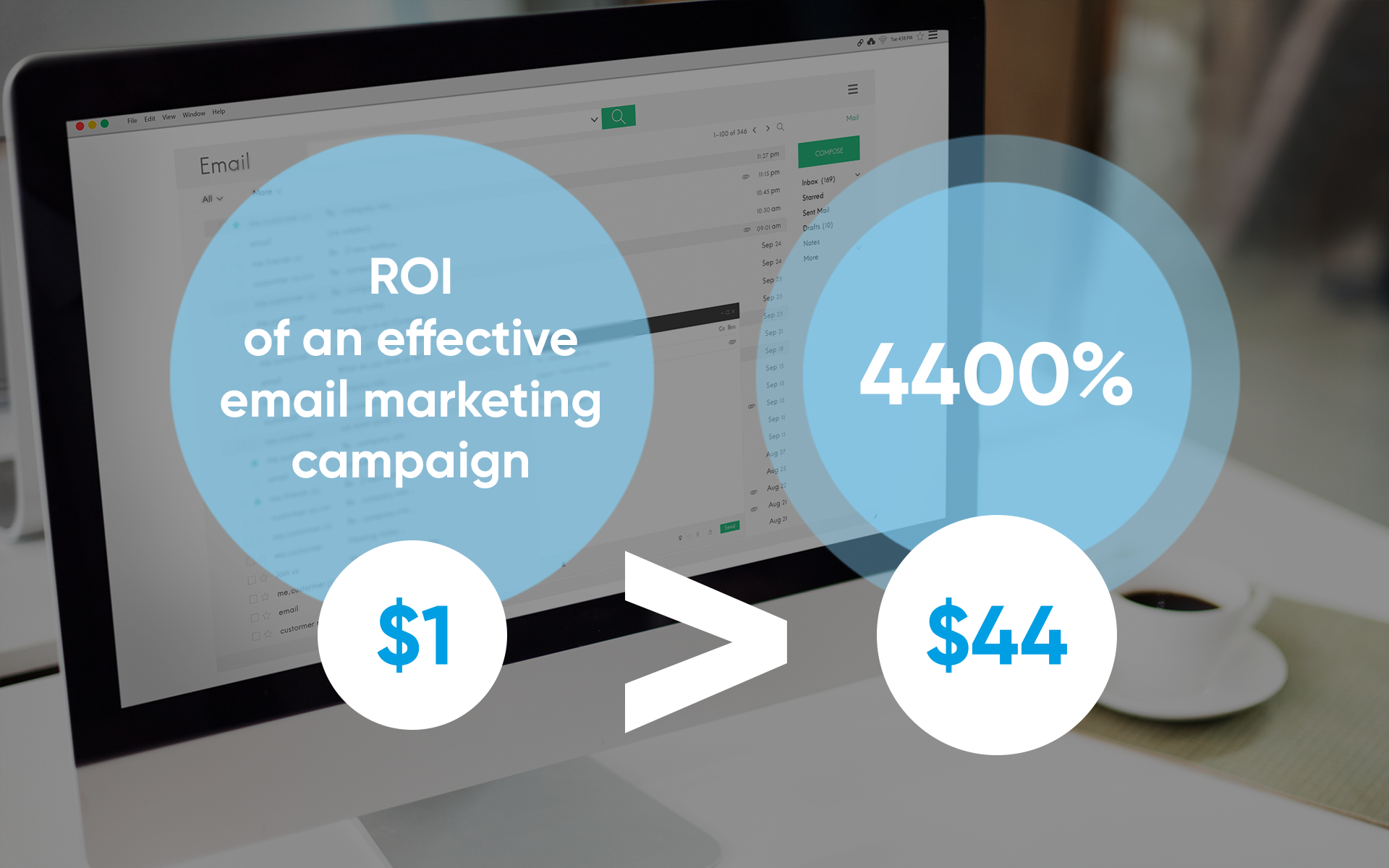 Fun Fact: According to Campaign Monitor, the ROI of an effective email marketing campaign is 4400% – returning $44 for every $1 spent on marketing.
Fun Fact: According to Campaign Monitor, the ROI of an effective email marketing campaign is 4400% – returning $44 for every $1 spent on marketing.
How CRM and Email Marketing Can Complement Each Other
CRM and Email Marketing are far from being competing sectors. They can actually work extremely well together. CRM can provide valuable customer insights, helping to craft personalized emails to target groups.
When the two are integrated, Email Marketing can feed customer responses back into the CRM, helping to update customer profiles. This also eliminates the need to import and export customer information from an external Email Marketing platform.
With all processes being kept under one roof, it’s far easier for sales reps to follow up on interactions. They will have an overview of all interactions – not only on the contact information but also on the campaign. They will be able to see how each customer interacted with their email campaigns in the past, providing insight for strategy on future campaigns.
So, that's the comparison. CRM and Email Marketing - different, yet complementary. They each have their strengths and can work together seamlessly for better results.
The Power of Integrated CRM and Email Marketing
The benefit of technological advancement is that it allows us to combine a range of powerful tools for improved efficiency.
Let's take a look at eWay-CRM for example, which merges CRM and Email Marketing in one place - your very well-known Microsoft Outlook.
With eWay-CRM, your existing Microsoft Outlook becomes a comprehensive CRM that also contains an Email Marketing module. With this, there is no need for additional tools or platforms as everything is in one place.
This intuitive integration enables you to manage and categorize your contacts and companies, leveraging this organized data for your marketing campaigns. A major benefit of this is no more jumping between systems.
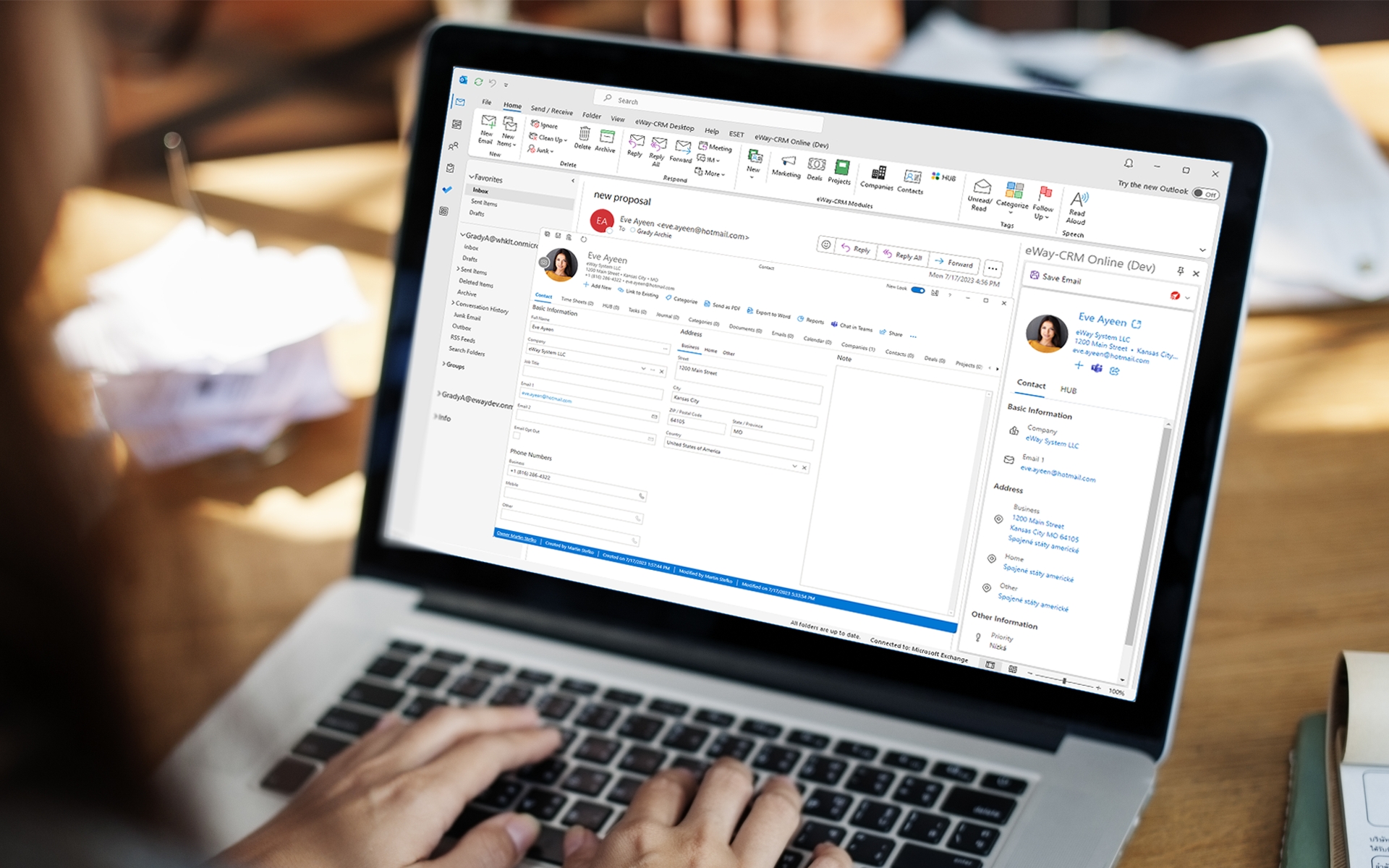 Fun Fact: eWay-CRM looks just like Outlook – fitting seamlessly into the familiar dashboard. This means you don’t have to learn anything new!
Fun Fact: eWay-CRM looks just like Outlook – fitting seamlessly into the familiar dashboard. This means you don’t have to learn anything new!
Being a fully-integrated CRM, eWay-CRM empowers you to store, organize and track a wealth of data. This ranges from contacts and companies to deals and projects. Businesses can utilize this data to strategically tailor their marketing campaigns.
And what about sending professional mass emails? eWay-CRM makes this easy with pre-made templates to make your emails look professional and visually appealing.
Tracking responses is a crucial aspect of Email Marketing. eWay-CRM automates this process, tracking email receipt, opening, and hyperlink clicks. This valuable information is instantly available to your sales team without the need for manual import. Sales reps can use this information to identify customer interests based on their responses to previous campaigns, tailoring their approach accordingly.
In addition, with the development of automated campaign features, eWay-CRM further optimizes workflows. When a new contact is added to the CRM, the system will automatically send a welcome email. Automated campaign features also include follow-up emails to revive customer interactions, and reminder emails – for example, when a product requires maintenance at certain intervals.
Mastering Customer Connections
CRM and Email Marketing are two different strategies with the common goal of improving customer relationships and driving business growth.
It's important to note that these two aren't mutually exclusive. They're different, yes. But they can also complement each other wonderfully. CRM can provide deep customer insights that help create effective Email Marketing campaigns. Similarly, customer responses from Email Marketing can enrich the CRM's data pool.
In addition, there are CRMs, like eWay-CRM, that incorporate Email Marketing as part of the system. The integration with Outlook further powers this combination.
As we wrap up this discussion, remember that the customer is at the heart of both strategies. CRM and Email Marketing are excellent tools to connect with these people - the customers - in meaningful and rewarding ways.










